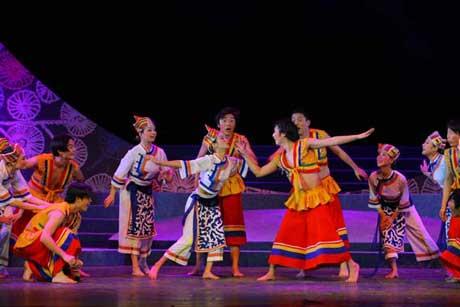Guangxi cultural heritage shown in Beijing
2010-03-24 09:05 BJT
Guangxi Zhuang Autonomous Region is populated by many ethnic groups. The region boasts a varied, preserved folk music culture. Folk artists who live in the region's rugged mountains and valleys have brought their rich musical traditions to Beijing, at the ethnic cultural heritage display being held in the city.
 |
| Folk artists who live in the region's rugged mountains and valleys have brought their rich musical traditions to Beijing, at the ethnic cultural heritage display being held in the city. |
A sacrifice ceremony came to life as a senior tribal member stepped onto the altar, with hieroglyphic characters hanging in the background.
This scene helps the audience understand that sacrifice rituals are where much of the folk tunes stem from. The Guangxi heritage show displays the region's legends, costumes, songs and dances.
Guangxi has a rich heritage of ballads. Weddings, birth ceremonies, funerals and harvest festivals all provide opportunities for locals to dress up in bright traditional clothes and sing to their heart's content. Songs are also a main way for youngsters to woo the ones they like.
Long Jiefeng, director of Guangxi Heritage Show, said, Guangxi is dubbed the "sea of tunes". We have the legendary diva "Sister Liu" who is known around the world. This show mixes musical legacies of various ethnic groups in Guangxi."
The Napo Zhuang ethnic minority, otherwise known as the "Black-clothed Zhuang", come from the southern part of the region. They are honored as "living fossils" of the folk songs of the Zhuang people. Napo Zhuang boast over 160 sets of folk tunes, sung at all sorts of occasions. The artists present the tunes with a very authentic flavor, in much the same form they've existed for centuries.

 Mail
Mail Share
Share Print
Print


 Video
Video









 2009 China Central Television. All Rights Reserved
2009 China Central Television. All Rights Reserved